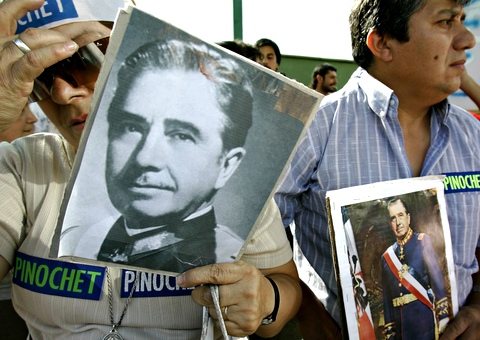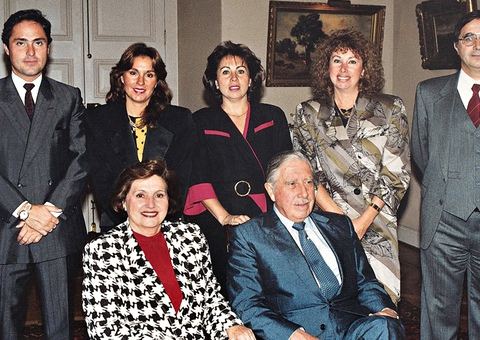Chile’s government has announced its much-anticipated plan to search for the victims of forced disappearance and political execution under Augusto Pinochet’s dictatorship, which began with a coup 50 years ago next month.
The plan nacional de búsqueda, or national search plan, will seek to establish the circumstances and conditions under which each person was forcibly disappeared, guarantee access to government records and provide reparations and guarantees for victims’ families.
It is the first time that the Chilean state has assumed responsibility for the search for victims of the Pinochet dictatorship, which ran from 1973 to 1990, despite families’ tireless efforts and hundreds of legal cases taken on by the judiciary.
Chile’s president, Gabriel Boric, announced the plan in a ceremony outside La Moneda, Chile’s presidential palace, on International Day of the Victims of Forced Disappearances on Wednesday.
“This plan is considered a permanent state policy, and as such is essential,” he said .“The commitment to truth and justice is inextinguishable, and will accompany us forever.”
A total of 40,175 people are registered victims of crimes under the Pinochet dictatorship ranging from imprisonment and torture to execution.
Of these, 1,092 are listed in the plan as forcibly disappeared and 377 as victims of political executions. Some were thrown into the Pacific Ocean or dumped in shallow graves in the Atacama desert and elsewhere.
The remains of only 307 previously missing victims have been identified since the return to democracy in 1990.
“The plan transforms the families’ efforts into a permanent public policy,” said Luís Cordero, the minister for justice and human rights. Two of his family members were kidnapped in 1973 and neither they nor their remains have ever been found.
“This is the first time ever that the state has assumed responsibility for the search, which is essential because the crimes were committed by the state and its agents in the context of a policy of repression.”
After eight months of consultations with victims’ families and other organisations, the Chilean state will now centralise information on its missing citizens – who have been symbolically included on the electoral roll since 2021 – for the first time. A budget for the plan will be determined in mid-September.
Campaigners, however, have said more still needs to be done. “It signals good intention from the government, and it is essential that we have a state-led policy,” said Álvaro González, the vice-president of the Agrupación de Familiares de Detenidos Desaparecidos, a national organisation of families that has spent 50 years tracking down victims.
“But we still have doubts about how effective this can be without the cooperation of the armed forces, who say they don’t have any information when we know that they do.”
“Pacts of silence” among the perpetrators of human rights abuses and members of the armed forces have consistently thwarted attempts to seek justice. This was complicated further by a 1978 amnesty law that excused perpetrators and accomplices of all crimes committed between 11 September 1973 – when Pinochet’s coup overthrew the socialist president Salvador Allende – nd 10 March 1978, without distinguishing between common and politically motivated crimes.
Since the return to democracy, the armed forces have handed over specific information and allowed limited access to facilities and records in the context of judicial investigations. Other individuals have made confessions or led investigators to locations of graves and other evidence as Chile continued its excruciating crawl towards justice.
Victims’ families have taken up the task of piecing together the last known traces of their loved ones since the early days of the dictatorship. In 1976, La Vicaria de la Solidaridad, a civil rights organisation, drew up giant grids known as la sábana, or the sheet, by hand with details and locations.
The search picked up in the 1990s, although the conditions of the delicate transition to democracy meant that progress was painstaking. Chilean courts have since processed 584 kidnapping cases, 169 murders and 85 illegal burials under the dictatorship.
In the most recent, Chile’s supreme court on Tuesday ordered 25-year sentences for aggravated kidnapping and homicide to seven former soldiers convicted of murdering the singer and folklorist Víctor Jara in 1973.
His British widow, Joan Jara, and her children were also given 150m pesos (£140,000) each in compensation.
Jara was brutally tortured at Estadio Chile, a small covered stadium in central Santiago, in the days after Pinochet’s coup. His body, riddled with 44 bullet holes, was dumped in a ditch near the city’s main cemetery with its neck and other bones broken.
Pinochet died in 2006 without being punished for the crimes he presided over, despite his arrest in London in 1998 by police acting on a request from Spain.
Forced disappearance “is a crime which re-victimises families every day with the absence of their loved ones”, said Cordero.
“For most of us, 50 years is a long wait. But for the families this is their today, their yesterday.”











